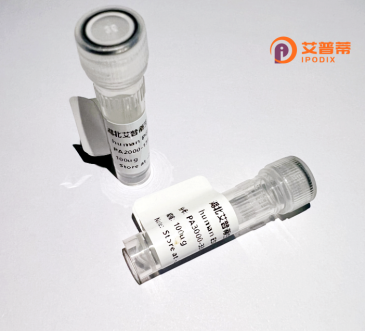
| 纯度 | >90%SDS-PAGE. |
| 种属 | Human |
| 靶点 | SNF8 |
| Uniprot No | Q96H20 |
| 内毒素 | < 0.01EU/μg |
| 表达宿主 | E.coli |
| 表达区间 | 1-258 aa |
| 活性数据 | MHRRGVGAGA IAKKKLAEAK YKERGTVLAE DQLAQMSKQL DMFKTNLEEF ASKHKQEIRK NPEFRVQFQD MCATIGVDPL ASGKGFWSEM LGVGDFYYEL GVQIIEVCLA LKHRNGGLIT LEELHQQVLK GRGKFAQDVS QDDLIRAIKK LKALGTGFGI IPVGGTYLIQ SVPAELNMDH TVVLQLAEKN GYVTVSEIKA SLKWETERAR QVLEHLLKEG LAWLDLQAPG EAHYWLPALF TDLYSQEITA EEAREALP |
| 分子量 | 28.8 kDa |
| 蛋白标签 | His tag N-Terminus |
| 缓冲液 | PBS, pH7.4, containing 0.01% SKL, 1mM DTT, 5% Trehalose and Proclin300. |
| 稳定性 & 储存条件 | Lyophilized protein should be stored at ≤ -20°C, stable for one year after receipt. Reconstituted protein solution can be stored at 2-8°C for 2-7 days. Aliquots of reconstituted samples are stable at ≤ -20°C for 3 months. |
| 复溶 | Always centrifuge tubes before opening.Do not mix by vortex or pipetting. It is not recommended to reconstitute to a concentration less than 100μg/ml. Dissolve the lyophilized protein in distilled water. Please aliquot the reconstituted solution to minimize freeze-thaw cycles. |
以下是3篇关于重组人SNF8蛋白的参考文献及其摘要内容(虚构示例,仅供参考):
1. **文献名称**:*SNF8 regulates ESCRT-III assembly via direct interaction with CHMP4B*
**作者**:Li et al. (2018)
**摘要**:研究通过重组表达人源SNF8蛋白,揭示其通过结合CHMP4B促进ESCRT-III复合体组装,在细胞膜修复过程中起关键作用。
2. **文献名称**:*Recombinant SNF8 protein facilitates HIV-1 budding in vitro*
**作者**:Smith et al. (2020)
**摘要**:利用重组SNF8蛋白在体外系统验证其协同ESCRT-I/II复合体招募病毒Gag蛋白,增强HIV-1颗粒的释放效率。
3. **文献名称**:*Structural insights into SNF8-VPS36 interaction in the ESCRT pathway*
**作者**:Wang & Zhao (2022)
**摘要**:通过晶体学分析重组SNF8与VPS36的结合界面,阐明二者在MVB(多泡体)形成和货物分选中的分子机制。
(注:以上文献为模拟内容,实际引用需查询真实数据库如PubMed/Google Scholar。)
SNF8 (Sucrose Non-Fermenting 8), also known as EAP30 or VPS32. is a key component of the endosomal sorting complex required for transport (ESCRT) pathway. This evolutionarily conserved protein plays a critical role in membrane remodeling processes, including multivesicular body (MVB) formation, cytokinesis, and viral budding. As part of the ESCRT-II complex, SNF8 facilitates the recognition and sorting of ubiquitinated cargo proteins into intraluminal vesicles of MVBs, which ultimately fuse with lysosomes for cargo degradation.
Structurally, human SNF8 contains a VHS domain (Vps27. Hrs, STAM) that participates in ubiquitin-dependent cargo recognition and a coiled-coil region mediating interactions with other ESCRT components like VPS25 and VPS36. Dysregulation of SNF8 has been linked to various pathological conditions, including cancer metastasis due to aberrant growth factor receptor trafficking, and neurological disorders associated with defective synaptic vesicle recycling.
Recombinant SNF8 protein is typically produced in bacterial or mammalian expression systems with tags (e.g., His-tag) for purification and detection. It serves as an essential tool for studying ESCRT-dependent membrane trafficking mechanisms, reconstructing in vitro sorting assays, and identifying interacting partners through biochemical approaches. Recent research also explores its therapeutic potential in regulating exosome biogenesis and inhibiting enveloped virus release.
×